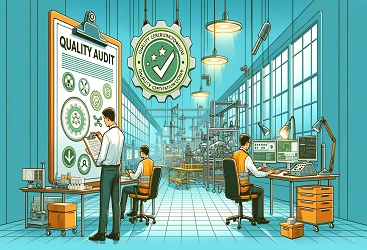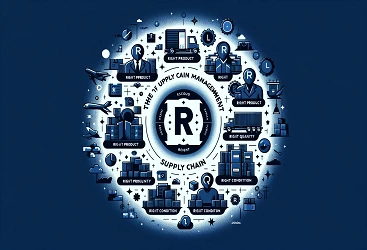What is Quality Audit?
A quality audit is a procedure in which a team of auditors, either internal or external, thoroughly examines a quality system. It is a key component ...
By AMREP | Posted on October 13, 2022
Updated on December 12, 2023

In today's fast-paced, global supply chain environment, manufacturers must react quickly and effectively to changing market conditions. While technology has made it easier than ever for manufacturers to source raw materials from suppliers around the world and track finished goods in real-time, these benefits come with risks that manufacturers need to understand and plan for accordingly. From natural disasters to cyber-attacks, there are several risks associated with the global supply chain that manufacturers need to know about. Let's take a look at some of Global Supply Chain risks and how you can mitigate them.
Supply chain risk is the potential for disruptions or delays in the supply chain. This can include everything from supplier problems and natural disasters to transportation issues and customer demand. Disruptions in the supply chain can have a major impact on a company in terms of cost and reputation. That's why companies need to have a plan in place to manage supply chain risk. Several ways to manage supply chain risk include diversifying suppliers, developing contingency plans, and investing in supply chain resiliency.
There are some basic types of supply chains you should consider while identifying risks in the global supply chain.
In today's global economy, manufacturers need to have an international supply chain strategy in place with contingencies for unforeseen disruptions or risk events. The cost of being unprepared can be staggering—not only in terms of financial impact but also from a reputation perspective. Supply chain risk management is an important part of any company's business strategy, regardless of size or scope. With the right planning and response procedures in place, manufacturers can mitigate even the most unexpected risks and prevent them from becoming disruptive. Learn and implement the expert's solutions to mitigate Global supply chain risks.
Manufacturers must know their component and material suppliers and the businesses distributing and selling their products. Suppliers, distributors, and retailers should also know their manufacturers. These parties should also conduct due diligence to ensure that the other parties are reputable and able to supply the parts promised.
A supply chain party should not assume liability exposure that dwarfs the profit created by the transaction or relationship. For example, a component supplier that makes one dollar profit on a widget should be reluctant to assume unlimited liability exposure for the downstream use of that widget, particularly if it is used in ways outside the supplier's control. By doing so, that supplier essentially becomes the world's cheapest insurance provider for the upstream parties.
Several contracts are involved in the procurement process, but they must be considered carefully. It will help if you consider your goal, the target audience, and their needs. It would help if you also considered whether the contract is required and what it should cover. These steps will help you create a contract that meets these requirements. You can also get production management solutions from a third-party quality management company like AMREP to handle all kind production issues.
Next, you will want to ensure that the contract is comprehensive. This means that every necessary detail is covered in the contract. This includes deadlines and compensation. Next, you will want to ensure that the contract is robust. This means that it covers all of the major points and that it is legally enforceable. Finally, you will want to ensure that the contract is clear. This means that it is easy for everyone to understand and follow. By following these steps, you can create a strong contract that meets all of your goals and requirements. quality management company like AMREP to handle all kind production issues.
Implementing indemnity clauses throughout the supply chain is essential to any compliance strategy. While they are not legally binding, they are a way to protect your reputation. They can also encourage other companies to adhere to the same standards, ultimately ensuring more safety for everyone involved. And remember, these provisions were put in place for a reason—they’re meant to protect you, your customers, and your employees from financial loss. So please don’t take them lightly!
You must take care of all of your suppliers when complying with product safety regulations. Whether this means making sure that they have the right safety systems in place or providing them with the necessary training, there are so many ways you can help ensure that all of your suppliers are on the same page regarding safety. And by doing so, you will be able to protect yourself and your business simultaneously. Also make sure to read the principles of supply chain management.
Product liability claims and other supply chain disputes often leave manufacturers and other supply chain parties uninsured or underinsured. For example, consumer and food product recalls and class actions can result in liability exposure in the millions or tens of millions of dollars; therefore, it is crucial to understand and insure for such risk.
Product liability claims and other supply chain disputes often leave manufacturers and other supply chain parties uninsured or underinsured. For example, consumer and food product recalls and class actions can result in liability exposure in the millions or tens of millions of dollars; therefore, it is crucial to understand and insure for such risk.
With global supply chain expansion, companies saw numerous benefits, such as inexpensive labor costs. But few of them were prepared for the risk involved in the modern supply chain. Here are the top 3 strategies recommended by our experts to mitigate supply chain risks.
Through the supply chain, organizations source materials, resources, and information or outsource business processes to third parties, facing multiple third-party risks ranging from IT and security risks to operational, financial, legal, and brand and reputational risks. This risk cannot be emphasized enough, and regulators expect organizations to take a more active approach to identifying and evaluating their third-party risks.
Global supply chains are difficult to manage because they are vulnerable to political and economic changes, communication failures, non-compliance with source-country regulations and standards, terrorism, and natural disasters. Many companies have accepted this new cost of doing business, only to be horrified by the devastating consequences of things going wrong. But firms who want to outsource their production must also plan a risk management strategy and involve the suppliers. Identify the risks and implement effective control when issues arise.
Organizations should work with their suppliers to build robust global supply chains because doing so would only be possible if they collaborate with them to manage risk. In addition to enhancing performance and increasing profits, the relationship between the two companies should benefit both sides.
Managing supply chain risk is essential to any business, and it's important to keep in mind that a lot of supply chain risks are out of your control. However, manufacturers can mitigate the risks by making the right decisions while they're still in control of their operations. By taking these steps, manufacturers can prevent disruptions in their supply chains and safeguard their reputations and bottom lines while they're at it!
If you are facing problems with supply chian management or have problematic suppliers? Simply contact us!.. Team of expert supplier quality engineers at AMREP is available to handle your global supply chain.
Read More :
Contact Us To See What We Can Do
Call Us
Mon - Sat 9.00 - 18.00
Sunday Closed


21 - September 2023
21
September
2023
A quality audit is a procedure in which a team of auditors, either internal or external, thoroughly examines a quality system. It is a key component ...

14 - October 2022
14
October
2022
Supply chain management (SCM) is the process of planning, measuring, and monitoring the flow of goods and services from the suppliers to the end customer...

19 - March 2022
19
March
2022
AMREP Supplier Management Services is back again working in the Defense Electronics industry. Previously our work was on night vision ...
